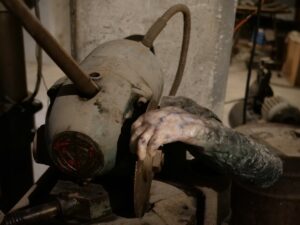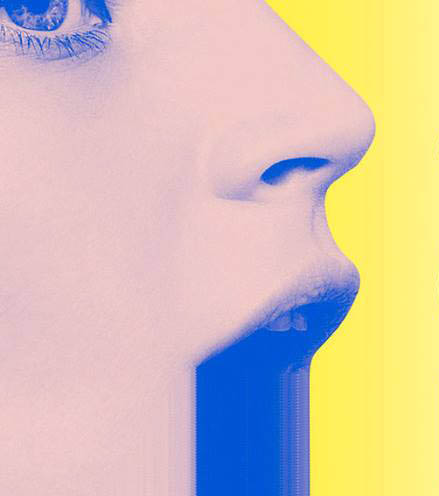Sartre reports that a certain Antoine Roquentin greatly enjoyed sticking his hands into muggy paste, but was shocked by touching stones, feeling a nausea, in his hands, for the tangible. The philosopher of La Nausée thus presented us with a character who, in the order of the material imagination, could not̀ accede to ‘solidism’ and consequently could never maintain a solid and intact attitude in life. Just a paranoid outcast.

Davide Quartucci, Fishing day, 2022, courtesy dell’artista e Officine Brandimarte
Now, in the main room of Hyperballard – exhibition by Vittorio Zeppillo and Davide Quartucci at Officine Brandimarte, curated by Benedetta Monti – some of Davide’s characters wander around in a swampy scenario: a man in his underwear (Fishing day). His legs are wide open, between them he is holding a ‘fishing rod’ to fish inside a tin, where only a gush of dirty water from old anchovies remains. He is also sitting there rotting himself, decomposing his lumpy polyurethane flesh in a neverending wait. In front, muddy yellow rain boots, empty. Perhaps all that will remain of the maniacal fisherman. Another man, on video (Puddles game), wearing boots and pants too; body of a flaccid slug. He gasps in the mud, spreading demented screams and laughter all over the swamp-hall. So we are approximating Davide’s imagery to that of a philosophical universe where the material is a revelation of being, where the discovery of the absurdity of human existence through the relationship with material is recounted.

Davide Quartucci, Puddles game, 2022, courtesy dell’artista e Officine Brandimarte
In particular, the viscous, which Sartre discusses in the last section of L’Être et le néant (1943), as a qualitative manifestation of Being, reveals, in the relationship with it, the whole essence of the individual through his response, that is what through desires and intentions he directs towards it. Thus, the derelict fishermen express the fullness of their vocation in their contact with that mud, – which outside of the symbolic is shit – and they take on its semblance, because the viscous calls the viscous, recognises it and takes it into itself when it encounters it. Specifying, however, that this metaphysics of the material does not refer to an a priori correspondence. The relationship with the material reveals not what one is, but a desire and a will to become. In Sartre’s words «the project of being»[1]. In this case, of being revolting. To suck, to drown in mud, to be contemptuous, not to stand up straight, not to be fair, if fairness is that of the Father-Man. And, rather, to rot in the sun.

Vittorio Zeppillo, Residui di un trampoliere (avvio di un corpo drogato), 2022, courtesy dell’artista e Officine Brandimarte
By mirror effect, repulsion and discomfort is also the spectator’s feeling because of this proximity: so even in front of the suicidal bodies in Vittorio’s paintings, (as in Residui di un trampoliere -avvio di un corpo drogato-), in their visual precariousness and in their unacceptable infliction of pain, «something careless turns to us and shows us the tongue, which, while it craves our being, attests with its mocking sneer our indelible affinity with this perverse stuff»[2]. An unfettered penetration and confusion, the indelible similarity between the disgusted and the disgusting, in an experience in which ‘the disgusting’ appears in its intimate essence: life announcing in itself an intention of death. One may think, following the phenomenology of the disgusting traced by Aurel Kolnai[3], that for these individuals, decomposition is a vitalistic choice, of freedom and therefore of diversity and loneliness, because more radically, the uncomfortable truth of the disgusting lies in the fact that it reflects the unmentionable human intention of death: «life – our own life – is intrinsically a desire for death and, for that same reason, always ready for decomposition»[4]. One last character on canvas, tremulous and grotesque, still by Davide, (Reverie no.2) is a blackbird. It watches the marsh scene. It recalls those other famous literary birds such as Pasolini’s crow or the parrot from La GerusalemmeLiberata [5] that, perched on the side of the drama, stand in place of conscience. All descending from the topos of the fate reading in birds [6], their presence is still a warning of an imminent but tragicomic end.

Vittorio Zeppillo, Hey dad, watch me play hard, dettaglio, 2023, courtesy dell’artista e Officine Brandimarte
It is then possible to descend a little further, on a narrative level, into the unconscious of the building, where repressed but not removed desires are buried; as if to a previous stage of consciousness for the adults above, whose deviance is accepted and made public. Here is Vittorio Zeppillo’s site-specific installation on the old machines from Brandimarte’s construction factory, and we will call this area ‘of suspended time’. On one hand because there is a discourse on the counter-truths of a world in which the mode of production pushes for progress and continuous updating, but which sits on a heap of dead goods, hidden -here literally- in the dark. Obsolete and, above all, orphaned machines. In Ehy dad, whatch me play hard, these machines directly invoke a father. On them, Vittorio grafts fragile and plagued-looking wax arms and hands, painted with the bluish veins, typical of old flesh.

Vittorio Zeppillo, Hey dad, watch me play hard, dettaglio, 2023, courtesy dell’artista e Officine Brandimarte
But these machines stuck in the past, as we said, are reactivated through an infantile unconscious of polymorphous perversity[7]: theirs is a hedonistic and masochistic attitude that lies in the unfulfilled desire to hurt themselves by laying those hands on the old, dangerous scrap metal, which however, structurally, is their own body. It seems then to be an unfulfilled masochism, which does not presume a relationship with another; more like a masturbation, to which one’s own father is asked to stand by and watch. To watch us hurt ourselves. Partly for revenge, partly because, maybe, dad, you’ll save me. But even in this, time is suspended; the machines are permanently arrested; the perverted child has grown up and has repressed, has never expressed, that unacceptable desire of pleasure and death, from which you, father, have always tried instead to escape. «The death that announces itself in life has already won its battle and of this victory we live anxiously the unsettling not yet»[8].
Arianna Tremolanti
[1] Sartre, J.-P., L’être et le néant. Essai d’ontologie phénoménologique, Parigi, Gallimard, (1943) 2019. Sartre, J.-P., L’essere e il nulla, tr. it. di G. Del Bo, Milano, Il Saggiatore, (1964) 2014, p. 642.
[2] A. Kolnai, “Der Ekel”, Jahrbuch für Philosophie und phänomenologische Forschung, X, 1929, p. 555. trad. it. di Marco Tedeschini.
[3] In ‘Der Ekel’, trad. it. ‘il disgusto’, 1929.
[4] Ivi, pp. 558-559. trad. it. di Marco Tedeschini.
[5] Si fa qui riferimento al corvo parlante da P.P. Pasolini, Uccellaci Uccellini, 1966; il pappagallo parlante nel giardino di Armida, in Torquato Tasso, Gerusalemme liberata, 1581.
[6] Ovvero degli àuguri romani, da cui gli uccelli del malaugurio.
[7] Da intendere alla lettera: per Freud, il bambino è perverso in quanto ricerca il piacere senza alcuna finalità riproduttiva, e polimorfo, poiché ricerca il piacere attraverso vari organi e tramite diverse zone erogene. Nell’installazione in questione, è in ballo un piacere relativo alle mani, nel loro contatto con macchinari pericolosi e potenzialmente mortali, così come suggerito dal titolo ‘[…] play hard’.
[8] M. Tedeschini, “At a Spit’s Distance”: Disgust and Fear in Aurel Kolnai and Jean-Paul Sartre, Itinera, N. 12, 2016, p.49.
Info:
Vittorio Zeppillo e Davide Quartucci. Hyperballad
curated by Benedetta Monti
29/04/2023 – 17/06/2023
Officine Brandimarte
Via Bengasi 6, Ascoli Piceno

is a contemporary art magazine since 1980






NO COMMENT